The Trust began after a visit to India in March 1990 when I was part of a delegation from an international organization. Our branch invited me to go, allowing the fulfillment of a lifelong dream. That first visit changed my life. We were to visit two centers, first in Trivandrum, then Madurai, where we were to discuss a proposed project to build a school for deaf children. This project was to be completed by the U.K. delegates, another story altogether. Both of our host organizations had other projects and, of course, were keen to show us around with strong hints of the need for funding.
After visiting Madurai, our delegation returned to Trivandrum, and our hosts took us to see their Boys Home with 24 resident children. They also shared their concern that their foreign funding was ending. You cannot fail to fall in love with a group of exuberant, bright-eyed young boys, so two of us decided to meet back in the U.K. with a view to taking over the funding for that home via sponsorship.
This we did, and I returned (alone) six months later to set up our sponsorship and payment plans. Another solo trip that included Madurai was followed by a visit with my co-founder and a group from England, which included my daughter, his son, and other friends. Over the next four years, with five more solo visits from me and another joint visit, all seemed well.
Here I need to split the stories; they are different if initially interlinked.
All seemed well in the first 3 years, and by now, the school project that had led to the original visit was nearing completion. A slum visit and willing help from one of the original staff led to the setting up of a child sponsorship program in Madurai, similar to the Trivandrum project. By now, I had completed 12 visits, dividing time between Madurai and Trivandrum. At this point, the then-senior manager of the Trivandrum group began to express concerns. Qualified staff had been replaced by the family of a board member, and there were suggestions of ill-treatment of the boys. I saw one example of a torn ear where the boy concerned had apparently been lifted by both ears and hit. I raised this with the Board and was told it was a misunderstanding. Shortly after my return to England, the concerned manager telephoned to say that, as a result of continuing ill-treatment and an incident of alleged sexual abuse (I had to take their word for this), the boys had a riot, caused a lot of damage, and were expelled from the home the same day, delivered to various locations near their original homes with no attempt at checking if care was available - after all, why were they in care in the first place? I went back to India within a few days and, with the manager, found all of the children. But the problem was what to do with them. The organization refused to have them back, saying they would replace them with other children, and the manager who had kept me informed was ostracized. As funding agents, we had responsibility since the boys were sponsored, so a small house was rented, and a housemother appointed. JJ, the manager, was in an untenable position for supporting the boys, so he resigned, and we took responsibility for his employment.
Here sadly came the initial parting of the ways with my co-sponsor who had U.K. affiliations with the organization and was reluctant to separate from the Trivandrum body. So he and his supporters continued to support the home and subsequent new children, while I continued to support the 24 expelled boys. This was to continue for the next six years as we moved from one rented home to the next. In doing so, we also started a Girls Home with children referred from another organisation. By now, we had over 30 children, and housing and funding became a big issue, as it is not permitted to fund projects without Government Foreign exchange permission. Our excellent Indian accountant, George, found ways around this, but it could not be a long-term solution.
What was a solution was to found our own Trust in India with me as the Settlor, which meant that nothing could be sold or changed without my (and/or our U.K. trustees') permission and written authorization. This was the best thing I did (though not quite realizing the significance at the time), and so, after many hours spent in offices and form filling, the new Trust was born.
Here we come to extremely important information that I wish could be considered by all U.K. charities supporting third-world projects.
Donating buildings or land - who subsequently has ownership? Indian trusts can be set up with local trustees; these trusts can then apply for foreign funding. Those (Indian) trustees/Managers effectively have ownership of any land and/or buildings purchased with foreign donations which will increase (considerably) in value over time. If the projects stop or come to an end, or if the funding agency closes, valuable assets are in the hands of the trustees who, of course, will not return those profits or assets to the original donors. The very least that foreign donors and trustees of such donations should do is to check thoroughly the registration and subsequent ownership of any land or building purchase they fund. Effusive relationships between foreign donors and (Indian) Trusts make this more difficult, and daring to ask, check or challenge such use of funds can lead to unpleasant consequences. U.K. trustees should never forget that they are stewards of donated funds with clear responsibilities.
Returning to Trivandrum, our growing boys and girls homes were struggling in rented buildings. Thanks to a generous donation from the Norwich Diocesan Lent projects and our ever-willing sponsors, we were in a position to purchase an acre of land and then to erect three buildings: a boys home, a girls home, and a dining block. Two years of building eventually led to a grand opening of our new homes, by Bishops and multi-denominational clergy and dignitaries from Kerala, and over the next 16 years, we provided long-term residential care for well over a hundred destitute children and a daily tuition center for several hundred more. Our original “discarded” children graduated from the centre, several completing degree courses, all moving into work. The land and buildings were and are registered to our Trust, and ownership is retained by the U.K. trustees. However, this is about to change. The effects of the Tsunami in 2004 had caused devastation to paddy fields in coastal Kerala, leading to mass unemployment among the interim paddy laborers. Many children needed residential care as a result, plus of course our own residential children. Years later, the COVID pandemic effectively closed our homes, and as recovery has happened, we realize that the need for residential care has lessened. We retain ownership. After discussions and negotiations, we have decided to partly gift the complex to the *Marthoma Church, the largest church in Kerala, who will now plan to use the buildings for residential care of the elderly and physically and mentally disabled. It is pertinent to mention that the value of the complex has doubled. Commercial sale was an option, but this would have had tax implications; we also felt that the original donors gave their gifts for work with the poorest, not commercial gain. Perhaps this is the best example of why control of ownership is so important. Now we have the assurance that donors will know that their gifts will not personally benefit unknown individuals but will be permanently under the umbrella of the church to ensure caring for years to come.
*(Marthoma Church - Mar (Saint) Thoma (Thomas). St.Thomas started the church in Kerala).
While developing the boys and girls homes in the Trivandrum district, I became involved with the Regional Cancer Centre, which included two day-long lectures on terminal care. This led as a result to contact with the charitable wing, Care Plus. They wanted to provide palliative (end of life) care to poor cancer patients who were too sick to travel to the hospital. To do this, they needed an ambulance. We provided 2. Over the next 16 years, we provided 5 ambulances, including replacement vehicles, and paid fuel costs and driver’s salaries for almost half a million home visits to destitute terminally ill patients, referred by the main hospital. The few days I was able to spend on the ambulances over the years underlined the importance of this work and the real relief from suffering the visits provided. Probably some of the most important work we were part of.
This work with Care Plus also led to an opportunity for me to spend several days in the dermatology ward in a local hospital to learn (under the tutorage of Dr.Sindu) about Hansen's disease (leprosy) and other common skin conditions, invaluable lessons for later work.
During this time, which included over 21 visits to Madurai, several of those trips lasting a month and more, I helped to develop a project to provide a centre for street children and a centre for disabled children in the city. There was also some work with the elderly. This was co-funded by 2 separate groups under the original U.K. Trust. These projects are well-documented in the book published in 2015. (Touched by Untouchables). Although well developed, it reached a point where further progress of that work involved issues of propriety, which in turn led to a separation of the groups. This was a very difficult time. The main issue concerned the purchase and ownership of a large plot of land, which was considered important for further development by our Indian colleagues. I was not happy about this, and checks with authorities and registration offices upheld my concerns. My reported concerns were not accepted by one of the two U.K. funding groups who continued with the purchase, leaving me with no option but to resign. Within the group that remained, there were those from the U.K. more than willing to take over the work that had taken years to develop, but leaving Madurai after building the projects and relationships was difficult. However, the Trust in Kerala that I had started remained, and this enabled concentration on the growing work there and development of the residential children’s homes that were owned by us. It was to be two years before I could return to Madurai to work with previous co-workers to set up projects in a different part of this very needy city.
Within a year of returning to Madurai, we began to work (under license) in a local hospital with poor children with cancer who were unable to access the main specialist hospital.
The return to Madurai was enabled by support from those I had previously worked with in the city, and for security, another Trust was registered for work in that area. We began by concentrating on a slum that was home to 600 people and starting a lunch facility for elderly ladies working on the (then) rubbish tips. This work had developed, and we can now look back at 14 years of daily lunch provision for destitute elders. A center was set up to provide daily breakfast and tuition for slum children, then later adding evening tuition, weekend camps, and support with school necessities. Our numbers have always been 100+ children, and over the years, the additional tuition has enabled virtually all of the children to progress into employment, apprenticeships, and university education. We are now running tow centres, with the same loyal teachers. A bonus is that many of the children who have attended the center, then graduated, continue with us as volunteers.
It became apparent that many of the elders we cared for were living in the streets without any family to care for them. Therefore, we set up plans to purchase land and to build a care center. This was completed in 2014 and has provided secure and living accommodation for hundreds of ladies. The pandemic affected this, but the home is running again now. In view of past concerns, the Home is Trust registered, and a public meeting was called to explain ownership and future use.
Through one of our elders, we were put in contact with a small colony of leprosy patients. Most had been discharged from the nearby hospital but with serious physical disabilities and social stigma, were finding work difficult if not impossible. We started with medical camps as many had open wounds and needed basic treatment, and over the past six years, we have provided monthly antiseptic, bandages, rice, fruits, and multivitamins. We support 36 families.
Thanks to generous donations from two Rotary Clubs, one from the U.K. and the other from France, we were able to purchase two new ambulances that have been invaluable in our work with hospitals and children with cancer. Funds were also made available for us to start a small development farm some distance from the city. We have used this to introduce a growing bag system and the use of hydroponics to save water. It has been difficult to grow enough fodder for animals in drought conditions, so the farm is currently being used as a training centre.
Where opportunities have presented themselves, we have responded in short-term projects. For example, paying for the release of four bonded labor families and supporting them as they settle, providing shelter and allowances, and ensuring a return to the education of children. For 2 years, we provided aid to a destitute village in a drought area working with a local hospital. We were able to recommend that hospital to a U.K. Rotary Club who started an eye hospital there. As a result, we had free cataract surgery for some of our residential ladies. We have held camp days for children in the main cancer centres. Four study days for nurses have also been held. We support a small self-help project for village ladies. One of our Kerala staff hand-produced wooden holding crosses, and we have distributed almost a thousand to individuals and hospitals in Norfolk.
It has been and remains our objective to help the poorest with particular emphasis on medical care. The success of our projects is underpinned by our determination to use all donated funds for our work, and this is enabled by the work of a large number of dedicated volunteers- many were once children on our projects themselves. U.K. involvement for development has either been self-funded or funded by families and friends. Two of our full-time Indian staff were with us as children over 25 years ago.



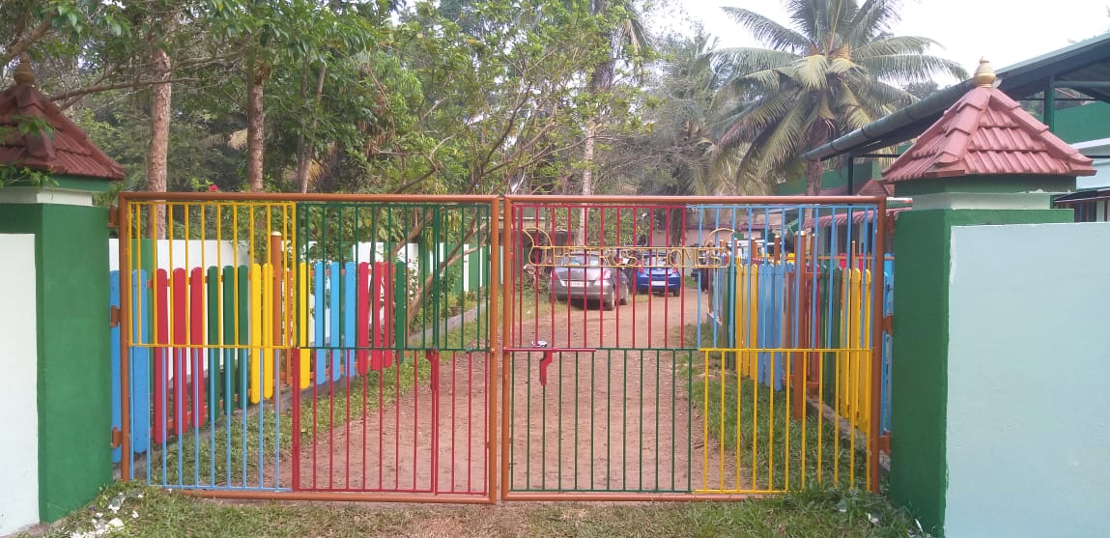
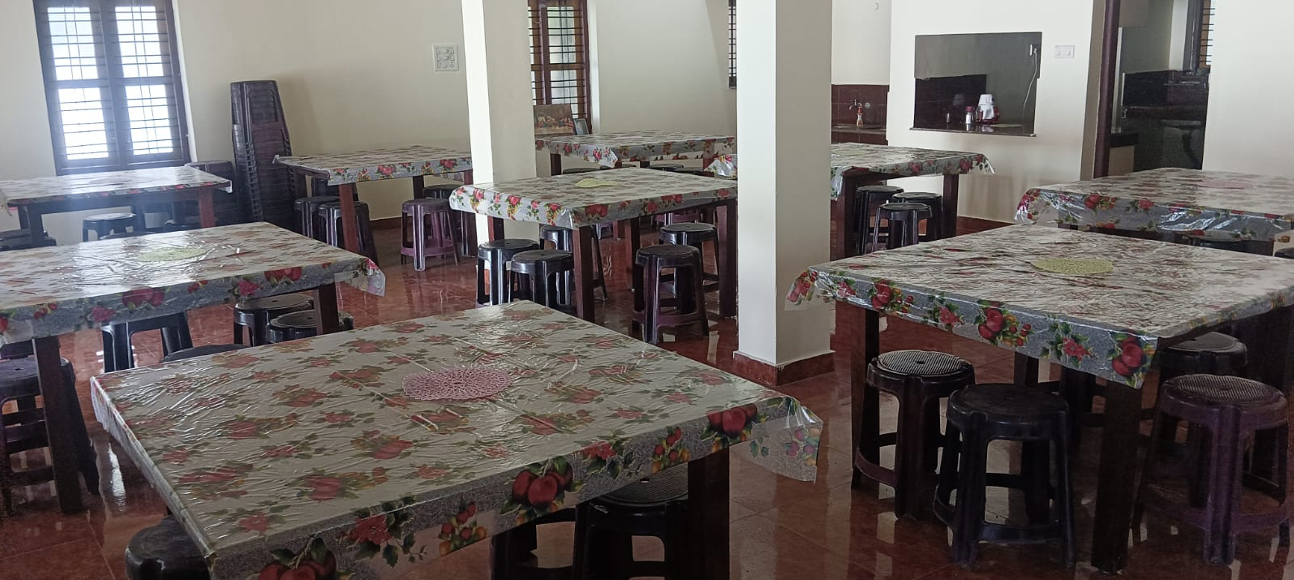




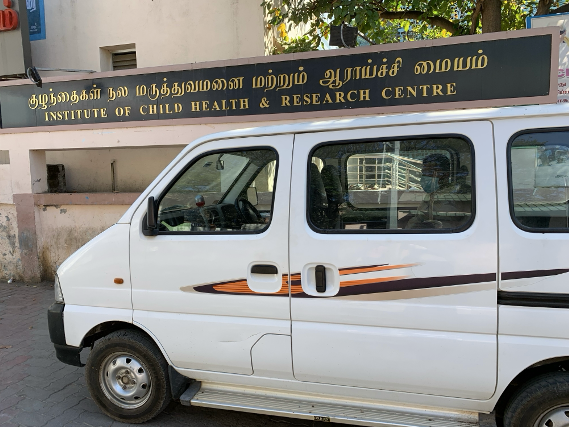

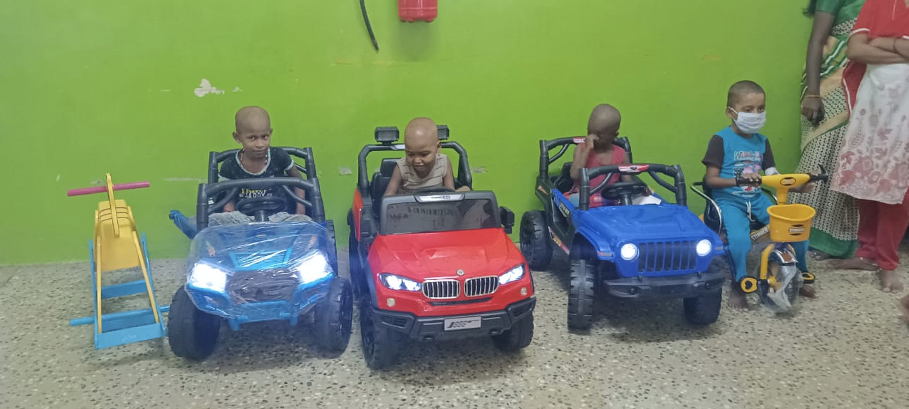


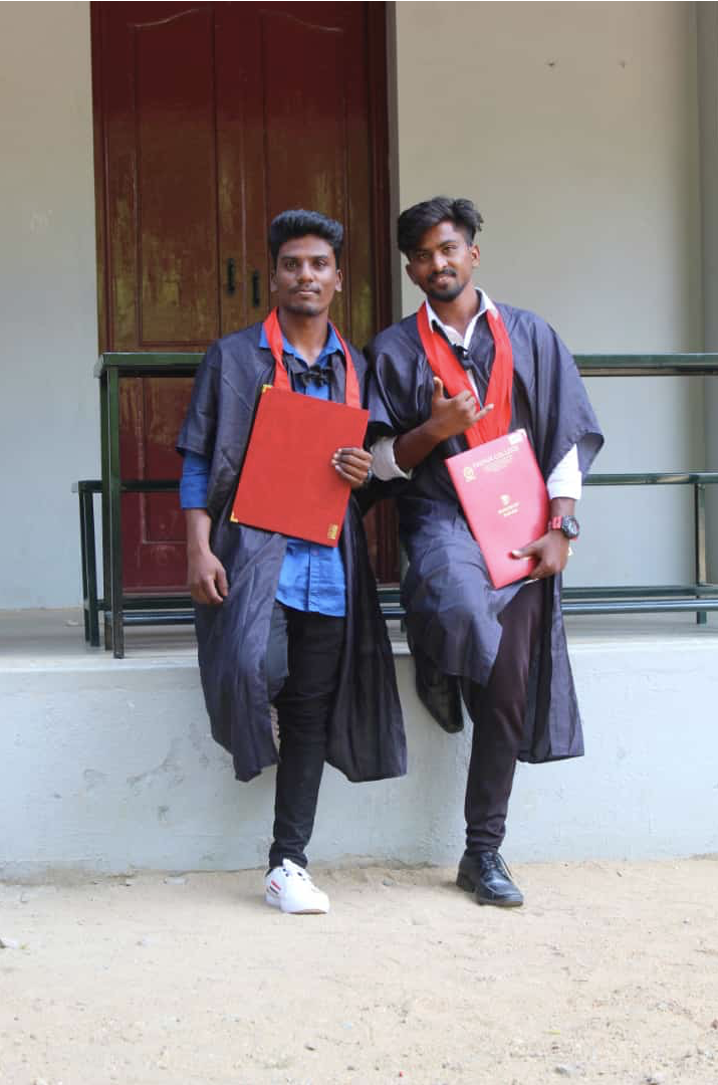

The Trust began after a visit to India in March 1990 when I was part of a delegation from an international organization. Our branch invited me to go, allowing the fulfillment of a lifelong dream. That first visit changed my life. We were to visit two centers, first in Trivandrum, then Madurai, where we were to discuss a proposed project to build a school for deaf children. This project was to be completed by the U.K. delegates, another story altogether. Both of our host organizations had other projects and, of course, were keen to show us around with strong hints of the need for funding.
After visiting Madurai, our delegation returned to Trivandrum, and our hosts took us to see their Boys Home with 24 resident children. They also shared their concern that their foreign funding was ending. You cannot fail to fall in love with a group of exuberant, bright-eyed young boys, so two of us decided to meet back in the U.K. with a view to taking over the funding for that home via sponsorship.
This we did, and I returned (alone) six months later to set up our sponsorship and payment plans. Another solo trip that included Madurai was followed by a visit with my co-founder and a group from England, which included my daughter, his son, and other friends. Over the next four years, with five more solo visits from me and another joint visit, all seemed well.
Here I need to split the stories; they are different if initially interlinked.
All seemed well in the first 3 years, and by now, the school project that had led to the original visit was nearing completion. A slum visit and willing help from one of the original staff led to the setting up of a child sponsorship program in Madurai, similar to the Trivandrum project. By now, I had completed 12 visits, dividing time between Madurai and Trivandrum. At this point, the then-senior manager of the Trivandrum group began to express concerns. Qualified staff had been replaced by the family of a board member, and there were suggestions of ill-treatment of the boys. I saw one example of a torn ear where the boy concerned had apparently been lifted by both ears and hit. I raised this with the Board and was told it was a misunderstanding. Shortly after my return to England, the concerned manager telephoned to say that, as a result of continuing ill-treatment and an incident of alleged sexual abuse (I had to take their word for this), the boys had a riot, caused a lot of damage, and were expelled from the home the same day, delivered to various locations near their original homes with no attempt at checking if care was available - after all, why were they in care in the first place? I went back to India within a few days and, with the manager, found all of the children. But the problem was what to do with them. The organization refused to have them back, saying they would replace them with other children, and the manager who had kept me informed was ostracized. As funding agents, we had responsibility since the boys were sponsored, so a small house was rented, and a housemother appointed. JJ, the manager, was in an untenable position for supporting the boys, so he resigned, and we took responsibility for his employment.
Here sadly came the initial parting of the ways with my co-sponsor who had U.K. affiliations with the organization and was reluctant to separate from the Trivandrum body. So he and his supporters continued to support the home and subsequent new children, while I continued to support the 24 expelled boys. This was to continue for the next six years as we moved from one rented home to the next. In doing so, we also started a Girls Home with children referred from another organisation. By now, we had over 30 children, and housing and funding became a big issue, as it is not permitted to fund projects without Government Foreign exchange permission. Our excellent Indian accountant, George, found ways around this, but it could not be a long-term solution.
What was a solution was to found our own Trust in India with me as the Settlor, which meant that nothing could be sold or changed without my (and/or our U.K. trustees') permission and written authorization. This was the best thing I did (though not quite realizing the significance at the time), and so, after many hours spent in offices and form filling, the new Trust was born.
Here we come to extremely important information that I wish could be considered by all U.K. charities supporting third-world projects.
Donating buildings or land - who subsequently has ownership? Indian trusts can be set up with local trustees; these trusts can then apply for foreign funding. Those (Indian) trustees/Managers effectively have ownership of any land and/or buildings purchased with foreign donations which will increase (considerably) in value over time. If the projects stop or come to an end, or if the funding agency closes, valuable assets are in the hands of the trustees who, of course, will not return those profits or assets to the original donors. The very least that foreign donors and trustees of such donations should do is to check thoroughly the registration and subsequent ownership of any land or building purchase they fund. Effusive relationships between foreign donors and (Indian) Trusts make this more difficult, and daring to ask, check or challenge such use of funds can lead to unpleasant consequences. U.K. trustees should never forget that they are stewards of donated funds with clear responsibilities.
Returning to Trivandrum, our growing boys and girls homes were struggling in rented buildings. Thanks to a generous donation from the Norwich Diocesan Lent projects and our ever-willing sponsors, we were in a position to purchase an acre of land and then to erect three buildings: a boys home, a girls home, and a dining block. Two years of building eventually led to a grand opening of our new homes, by Bishops and multi-denominational clergy and dignitaries from Kerala, and over the next 16 years, we provided long-term residential care for well over a hundred destitute children and a daily tuition center for several hundred more. Our original “discarded” children graduated from the centre, several completing degree courses, all moving into work. The land and buildings were and are registered to our Trust, and ownership is retained by the U.K. trustees. However, this is about to change. The effects of the Tsunami in 2004 had caused devastation to paddy fields in coastal Kerala, leading to mass unemployment among the interim paddy laborers. Many children needed residential care as a result, plus of course our own residential children. Years later, the COVID pandemic effectively closed our homes, and as recovery has happened, we realize that the need for residential care has lessened. We retain ownership. After discussions and negotiations, we have decided to partly gift the complex to the *Marthoma Church, the largest church in Kerala, who will now plan to use the buildings for residential care of the elderly and physically and mentally disabled. It is pertinent to mention that the value of the complex has doubled. Commercial sale was an option, but this would have had tax implications; we also felt that the original donors gave their gifts for work with the poorest, not commercial gain. Perhaps this is the best example of why control of ownership is so important. Now we have the assurance that donors will know that their gifts will not personally benefit unknown individuals but will be permanently under the umbrella of the church to ensure caring for years to come.
*(Marthoma Church - Mar (Saint) Thoma (Thomas). St.Thomas started the church in Kerala).





While developing the boys and girls homes in the Trivandrum district, I became involved with the Regional Cancer Centre, which included two day-long lectures on terminal care. This led as a result to contact with the charitable wing, Care Plus. They wanted to provide palliative (end of life) care to poor cancer patients who were too sick to travel to the hospital. To do this, they needed an ambulance. We provided 2. Over the next 16 years, we provided 5 ambulances, including replacement vehicles, and paid fuel costs and driver’s salaries for almost half a million home visits to destitute terminally ill patients, referred by the main hospital. The few days I was able to spend on the ambulances over the years underlined the importance of this work and the real relief from suffering the visits provided. Probably some of the most important work we were part of.
This work with Care Plus also led to an opportunity for me to spend several days in the dermatology ward in a local hospital to learn (under the tutorage of Dr.Sindu) about Hansen's disease (leprosy) and other common skin conditions, invaluable lessons for later work.
During this time, which included over 21 visits to Madurai, several of those trips lasting a month and more, I helped to develop a project to provide a centre for street children and a centre for disabled children in the city. There was also some work with the elderly. This was co-funded by 2 separate groups under the original U.K. Trust. These projects are well-documented in the book published in 2015. (Touched by Untouchables). Although well developed, it reached a point where further progress of that work involved issues of propriety, which in turn led to a separation of the groups. This was a very difficult time. The main issue concerned the purchase and ownership of a large plot of land, which was considered important for further development by our Indian colleagues. I was not happy about this, and checks with authorities and registration offices upheld my concerns. My reported concerns were not accepted by one of the two U.K. funding groups who continued with the purchase, leaving me with no option but to resign. Within the group that remained, there were those from the U.K. more than willing to take over the work that had taken years to develop, but leaving Madurai after building the projects and relationships was difficult. However, the Trust in Kerala that I had started remained, and this enabled concentration on the growing work there and development of the residential children’s homes that were owned by us. It was to be two years before I could return to Madurai to work with previous co-workers to set up projects in a different part of this very needy city.
Within a year of returning to Madurai, we began to work (under license) in a local hospital with poor children with cancer who were unable to access the main specialist hospital.
The return to Madurai was enabled by support from those I had previously worked with in the city, and for security, another Trust was registered for work in that area. We began by concentrating on a slum that was home to 600 people and starting a lunch facility for elderly ladies working on the (then) rubbish tips. This work had developed, and we can now look back at 14 years of daily lunch provision for destitute elders. A center was set up to provide daily breakfast and tuition for slum children, then later adding evening tuition, weekend camps, and support with school necessities. Our numbers have always been 100+ children, and over the years, the additional tuition has enabled virtually all of the children to progress into employment, apprenticeships, and university education. We are now running tow centres, with the same loyal teachers. A bonus is that many of the children who have attended the center, then graduated, continue with us as volunteers.


It became apparent that many of the elders we cared for were living in the streets without any family to care for them. Therefore, we set up plans to purchase land and to build a care center. This was completed in 2014 and has provided secure and living accommodation for hundreds of ladies. The pandemic affected this, but the home is running again now. In view of past concerns, the Home is Trust registered, and a public meeting was called to explain ownership and future use.
Through one of our elders, we were put in contact with a small colony of leprosy patients. Most had been discharged from the nearby hospital but with serious physical disabilities and social stigma, were finding work difficult if not impossible. We started with medical camps as many had open wounds and needed basic treatment, and over the past six years, we have provided monthly antiseptic, bandages, rice, fruits, and multivitamins. We support 36 families.

Thanks to generous donations from two Rotary Clubs, one from the U.K. and the other from France, we were able to purchase two new ambulances that have been invaluable in our work with hospitals and children with cancer. Funds were also made available for us to start a small development farm some distance from the city. We have used this to introduce a growing bag system and the use of hydroponics to save water. It has been difficult to grow enough fodder for animals in drought conditions, so the farm is currently being used as a training centre.


Where opportunities have presented themselves, we have responded in short-term projects. For example, paying for the release of four bonded labor families and supporting them as they settle, providing shelter and allowances, and ensuring a return to the education of children. For 2 years, we provided aid to a destitute village in a drought area working with a local hospital. We were able to recommend that hospital to a U.K. Rotary Club who started an eye hospital there. As a result, we had free cataract surgery for some of our residential ladies. We have held camp days for children in the main cancer centres. Four study days for nurses have also been held. We support a small self-help project for village ladies. One of our Kerala staff hand-produced wooden holding crosses, and we have distributed almost a thousand to individuals and hospitals in Norfolk.
It has been and remains our objective to help the poorest with particular emphasis on medical care. The success of our projects is underpinned by our determination to use all donated funds for our work, and this is enabled by the work of a large number of dedicated volunteers- many were once children on our projects themselves. U.K. involvement for development has either been self-funded or funded by families and friends. Two of our full-time Indian staff were with us as children over 25 years ago.